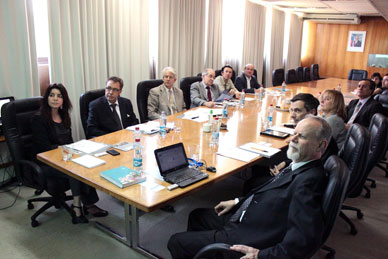- The first meeting was held by the end of November at our University, with a delegation of University College London (UCL), which agreed to put in contact its experts with academics of the Faculty of Engineering and the Advanced Studies Institute of our University before the end of the year.
With the presence of a group of academics of the University College London, United Kingdom, our University’s authorities signed an agreement of collaboration and student mobility between both higher education institutions.
The three UCL representatives were the Pro-Provost for the Americas, Alejandro Madrigal; the Director of the Centre for Languages and International Education, Christine Hoffman; and the Director of the Office for International Affairs, Nigel Percival. Universidad de Santiago representatives who enabled the agreement were the Dean of the Faculty of Engineering, Ramón Blasco; the Head of the Department of Scientific Research Projects Management, Pablo Vera; the Head of the Department of International and Inter-University Relations, Carol Johnson; the Vice Dean for Academic Affairs of the Faculty of Engineering, Ricardo Vega; the Vice Dean for Research of the Faculty of Humanities, Miguel Farías and professor Gastón Herrera, from the School of Architecture.
Although it was the first meeting, it was very fruitful. Carol Johnson, Head of the Department of International and Inter-University Relations said, “Some agreements were already set, like the one regarding the collaboration between the UCL and the Faculty of Engineering to support or participate in ongoing projects, like Ingeniería 2030. We also agreed to put in contact UCL’s Centre for Latin American Studies with our Institute for Advanced Studies (IDEA, in Spanish). At the same time, we will work on a student mobility agreement.”
During the meeting, the delegations agreed on the main areas of interest for both institutions where some joint projects could be started and for which this British University has some funds awarded by the Santander Scholarship. “They offered these funds to us in case our academics and theirs are interested in starting some collaboration project,” Carol Johnson said.
History and quality
The possibility of finding common interests between UCL and Universidad de Santiago was enabled by the British Council, organization that already knew our university’s interest in creating bonds with other universities in the United Kingdom.
“Our Corporation, through its internationalization policy, has the purpose of building links with universities of excellence. University College London is a diverse and complete institution, with a great development in research, and it is in the fourth place in the QS Rankings,” Carol Johnson said.
The Engineering academics were going to contact each other before the British delegation left the country, while the contact between IDEA and the UCL’s Centre for Latin American Studies should be made before the end of this year. “And soon we will be working on a student mobility collaboration agreement and we expect it to yield results during 2014,” she added.
During the meeting where the agreements were signed, the three academics from the British institution showed themselves willing to broaden the areas of mutual collaboration. They learned about the history behind the 164 years of our University, its spirit, hallmark and culture; the quality of its academics, alumni, and its contribution to society.
Over more than 180 years of existence, the UCL has contributed to the scientific and social development through achievements and discoveries that have marked its legacy. Among its former students, there are several Nobel Prize winners and famous alumni. Besides, it has cooperation agreements with several universities around the world, with integrating and multicultural projects, from the point of view of a global university that to provides the world with solutions.



